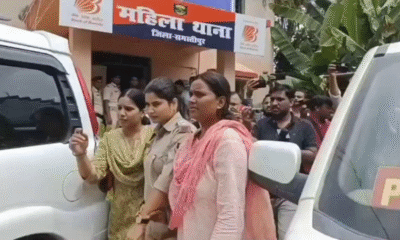News
India offers zero-for-zero tariffs on auto parts, steel from US
India has proposed eliminating tariffs on limited quantities of steel, auto components, and pharmaceuticals in its trade negotiations with the United States. Under this proposal, zero duties would apply up to a specified import threshold, after which standard tariffs would resume. The offer is aimed at accelerating the finalization of a bilateral trade agreement, expected by fall, with a focus on key sectors before the current U.S. tariff pause expires.

India has proposed zero tariffs on steel, auto components, and pharmaceuticals on a reciprocal basis, up to a certain quantity of imports, in its trade negotiations with the US, according to sources familiar with the matter. Beyond this threshold, imported industrial goods would be subject to the regular duty rates, the sources said, requesting anonymity due to the confidential nature of the discussions. The offer was made by Indian trade officials during a visit to Washington late last month to accelerate negotiations on a bilateral trade deal expected by this fall.
The two countries are prioritizing specific sectors to finalize an early trade agreement before the end of the 90-day pause on US President Donald Trump’s retaliatory tariffs, the sources added.
Amid a slowdown in the US economy, Trump indicated on Sunday that some trade deals could be concluded as early as this week, providing relief for trading partners seeking to avoid higher US import duties. Asian economies, including South Korea, Japan, and India, are among those competing to reach interim agreements with the US administration.
News
Will Take Necessary Action, This Won’t Be Left Unattended: Civil Aviation Minister on IndiGo Fiasco

Union Civil Aviation Minister Ram Mohan Naidu Kinjarapu has assured strict action against IndiGo following the widespread flight delays and cancellations that have disrupted air travel across the country for nearly five days. The minister emphasised that the situation is gradually stabilising and expressed confidence that normal operations would resume shortly.
Speaking to ANI, Naidu said that the government’s top priority is restoring normalcy, clearing passenger backlogs, and ensuring that airlines comply with mandated operational norms.
Govt Says Situation Improving; Backlogs Being Cleared
The minister provided an update on the improving conditions at key airports:
“Today, we are seeing that the situation is getting better. The backlogs that have been there for the last two days have been cleared. From tomorrow, we are expecting normalcy—there won’t be any congestion or waiting at airports,” Naidu said.
He noted that IndiGo has been instructed to resume operations at maximum capacity, and the aviation ministry is closely monitoring compliance with Flight Duty Time Limit (FDTL) norms and overall network scheduling.
Centre Forms Inquiry Committee, Promises Action
Addressing public frustration over the chaos, Naidu confirmed that a high-level committee has been constituted to thoroughly investigate the disruption:
“We have formed a committee which will inquire into all this—what went wrong and who is responsible. We are going to take necessary action. This should not be left unattended. Strict action will be taken so that those responsible are held accountable.”
The probe will examine whether mismanagement, staff issues, operational lapses, or violations of safety and duty norms contributed to the crisis.
IndiGo’s Disruptions Continue for Fifth Consecutive Day
India’s largest airline has been struggling to stabilise operations:
- Over 1,000 flights were cancelled on Friday, after another 550 cancellations on Thursday.
- Delays and cancellations continued into Saturday across several major airports.
Despite Delhi airport reporting gradual stabilisation, multiple hubs continued to face disruptions:
Airport-wise Impact
Thiruvananthapuram Airport (Kerala):
- 3 domestic arrivals cancelled
- 3 domestic departures cancelled
Ahmedabad Airport (Gujarat):
- Between 12 am and 6 am on December 6:
- 7 arrivals cancelled
- 12 departures cancelled
Passengers across the country have reported long queues, rescheduled flights, inadequate communication, and missed connections—leading to growing criticism of the airline.
What Led to the IndiGo Crisis?
While the detailed causes will emerge after the committee’s evaluation, preliminary industry reports indicate:
- Large-scale crew unavailability
- Potential FDTL violations leading to grounded staff
- Scheduling mismatches
- High passenger load during peak travel season
- Possible operational inefficiencies
The Civil Aviation Ministry said it will ensure better monitoring, stronger crisis management protocols, and enhanced passenger support mechanisms going forward.
Government’s Message to Passengers
Minister Naidu reassured passengers that the government is actively intervening to ensure service restoration:
“We are deeply observing this. We will ensure all airlines follow due diligence. Passenger inconvenience will not be tolerated.”
The ministry is expected to issue a formal advisory soon, emphasizing accountability and stronger passenger-rights enforcement for airlines.
News
Russia-India Agree to Exchange Troops, Warships for Military Drills in Major Defence Pact: Key Features

Russia’s lower house of parliament, the State Duma, has formally approved the Reciprocal Exchange of Logistic Support (reLOS) agreement with India—an important development that comes just days ahead of President Vladimir Putin’s state visit to New Delhi on December 4–5. The pact marks a significant step in strengthening strategic military interoperability between the two long-standing defence partners.
🇷🇺🇮🇳 Pact to Deepen Strategic Cooperation
The reLOS pact—initially signed on February 18 and forwarded for ratification last week by Russian Prime Minister Mikhail Mishustin—lays down a structured mechanism for the deployment of military units, warships, and aircraft between India and Russia. The agreement also spells out comprehensive logistic support that both nations can provide each other, including:
- Fuel and refuelling support
- Maintenance and repair services
- Berthing and port logistics
- Supplies and medical assistance
- Operational support during missions
At the Duma’s plenary session, Speaker Vyacheslav Volodin highlighted the strategic significance of the pact, stating that its ratification represents another major step toward strengthening long-term defence reciprocity.
🌍 When Will the Agreement Apply?
The reLOS pact will be applicable during a wide range of joint and mutually approved operations, including:
- Bilateral and multilateral military exercises
- Training missions
- Humanitarian assistance and disaster relief (HADR)
- Natural and man-made disaster response
- Other deployments mutually agreed upon by both governments
A statement on the Duma’s website emphasized that the pact will streamline access to each other’s airspace, making it easier for naval vessels to conduct port calls and for aircraft to conduct coordinated operations. The approval sends a clear signal of Moscow’s intent to reinforce its defence partnership with India ahead of Putin’s high-level visit.
🚀 Big-Ticket Defence Deals on the Agenda: Su-57 & S-400
The pact’s ratification comes just a day after the Kremlin confirmed that discussions on major defence platforms—including the Sukhoi Su-57 fifth-generation stealth fighter and additional S-400 air defence systems—will feature prominently during the Modi-Putin summit.
Kremlin spokesperson Dmitry Peskov said:
He also reiterated the importance of protecting bilateral ties from external interference, calling the India–Russia partnership “mutually beneficial.”
India’s Past Role in Su-57 Development
India was originally a major collaborator in the FGFA (Fifth Generation Fighter Aircraft) programme based on the Su-57 platform and contributed toward shaping advanced requirements. However, concerns about:
- cost overruns
- limited technology access
- performance gaps
led India to exit the programme. Despite this, the Su-57 continues to be part of ongoing military-technical discussions.
🛡️ Status of the S-400 Deal
India and Russia signed a $5 billion agreement in 2018 for five S-400 squadrons. Out of these, three have already been delivered, with the remaining units expected to be discussed during the Putin-Modi meeting.
The S-400 continues to be a priority for India’s air defence strategy despite geopolitical pressures and CAATSA-related concerns from the West.
⭐ Why This Pact Matters
The reLOS agreement places India–Russia defence cooperation on a similar footing as India’s logistics pacts with the US, France, Australia, Japan and South Korea, signifying:
- greater operational reach for both militaries
- simplified logistics during joint exercises
- closer strategic alignment
- enhanced readiness during crises and regional contingencies
With Putin’s visit around the corner, the approval of the reLOS pact reinforces the deep and evolving nature of the India–Russia defence partnership, even amid shifting global alliances.
News
India rebuts Pakistan’s propaganda on airspace clearance for aid flight to cyclone-hit Sri Lanka

India has firmly dismissed claims circulating in Pakistani media that New Delhi denied overflight permission to a Pakistani aircraft carrying humanitarian assistance to cyclone-ravaged Sri Lanka. Calling the allegations “baseless, misleading, and part of routine propaganda”, Indian officials clarified that the request from Islamabad was processed swiftly and in accordance with international norms.
Rapid clearance given within hours
According to officials, Pakistan submitted its overflight request around 1:00 pm (IST) on Monday, seeking same-day clearance to traverse Indian airspace en route to Colombo. Recognising the humanitarian nature of the mission — intended to transport emergency relief supplies to Sri Lanka — India handled the request with special urgency.
The clearance was processed, approved, and formally communicated to Pakistani authorities by 5:30 pm (IST) the very same day, completing the procedure in just about four hours — much faster than standard inter-governmental clearances.
Officials emphasised that New Delhi granted permission despite Pakistan continuing to block its own airspace for Indian flights for several years.
Cyclone Ditwah devastates Sri Lanka
Sri Lanka is presently grappling with the catastrophic aftermath of Cyclone Ditwah, which unleashed widespread floods, landslides, and infrastructural destruction across multiple regions.
- Over 300 people have lost their lives
- Thousands have been displaced
- Roads, bridges, and communication lines remain severely disrupted
Emergency operations are intensifying as new areas continue to report distress signals.
India’s Operation Sagar Bandhu: Major humanitarian support underway
In response to the unfolding crisis, India has activated Operation Sagar Bandhu, a large-scale humanitarian relief mission aimed at supporting its closest maritime neighbour.
Prime Minister Narendra Modi expressed deep grief over the loss of lives and assured Colombo of India’s unwavering support.
Under the operation:
- 53 tonnes of relief materials have been delivered to Sri Lanka via air and sea operations since November 28
- Items include food supplies, medical kits, tents, water purification systems, blankets, and essential rescue gear
- Over 2,000 stranded Indian nationals have already been evacuated from disaster-hit zones
- NDRF teams are actively participating in ongoing rescue operations across isolated and severely affected regions
In its latest update, the Ministry of External Affairs stated:
A pattern of misinformation
This incident adds to a series of claims by Pakistani media targeting India on diplomatic or humanitarian matters. Indian officials maintain that such narratives are aimed at misleading the public and distorting bilateral interactions, especially when coordination involves sensitive humanitarian operations.
Despite these challenges, India’s swift clearance demonstrates its commitment to humanitarian principles, regional cooperation, and its longstanding policy of supporting Sri Lanka in times of crisis.
-

 Celebrity Lifestyle7 months ago
Celebrity Lifestyle7 months agoEx-Cricketer Shikhar Dhawan Buys Ultra-Luxury Apartment Worth ₹69 Crore in Gurugram
-

 Crime & Investigation5 months ago
Crime & Investigation5 months agoDelhi Police SI Neetu Bisht Caught Taking ₹20 Lakh Bribe – Shocking Details Emerge in Corruption Probe
-

 Glamour & Entertainment6 months ago
Glamour & Entertainment6 months agoTelegram Channels Disseminating Pro‑Russian Propaganda in Poland
-

 Business6 months ago
Business6 months agoAmazon sets 30‑day relocation deadline for corporate staff—opt out by resigning in 60 days
-

 Entertainment6 months ago
Entertainment6 months agoAbhijeet & Dr Tarika Reunite in CID 2 — Fans Say ‘Clear the Misunderstanding Now
-

 Bollywood4 months ago
Bollywood4 months agoNo ₹3 Lakh Fine or 2-Year Jail: The Truth Behind the ‘Hakla’ GIF Buzz
-

 Celebrity Lifestyle6 months ago
Celebrity Lifestyle6 months agoMaha Kumbh Girl Monalisa seen in car allegedly worth ₹1 crore
-

 Education6 months ago
Education6 months agoNEET UG Controversy Explained: Paper Leak, Impersonations & Ongoing Probe




